Redditor Refuses To Get Rid Of Her Rescue Cat Because Her SIL Has A Phobia For Furry Things, Gets Accused Of Maltreatment
Cats and dogs are among the most popular pets on Earth. While your next-door neighbor might have all the lovely pets that anyone would want to cuddle, another neighbor might not even want to come close.
Some people have a phobia of cats, some have a phobia of dogs, and then there are those who have a phobia of anything that has fur. A good example is the OP's sister-in-law in today's AITA story.
The OP has a cat that was rescued from an abusive household, and her SIL wanted her to get rid of it. The OP couldn't, as this cat was brought home during a difficult time in her life and provided significant support.
So, the OP took extra measures to ensure the cat didn't come into contact with her SIL. They installed a child gate to block the staircase so the cat wouldn't go down, and when the SIL came upstairs, the OP took the cat to a room.
However, there were times when the cat would bolt out when the door was opened to enter the room. Still, the OP's sister-in-law insisted that she get rid of the cat, stating, "It's the least you can do for me."
The OP had to make a decision sooner or later, as the whole issue was creating distance between her brother and herself. Keep scrolling to find out how the entire story unfolded.
The Title

There were times when I'd think, "Who will take care of my cat if I leave?"
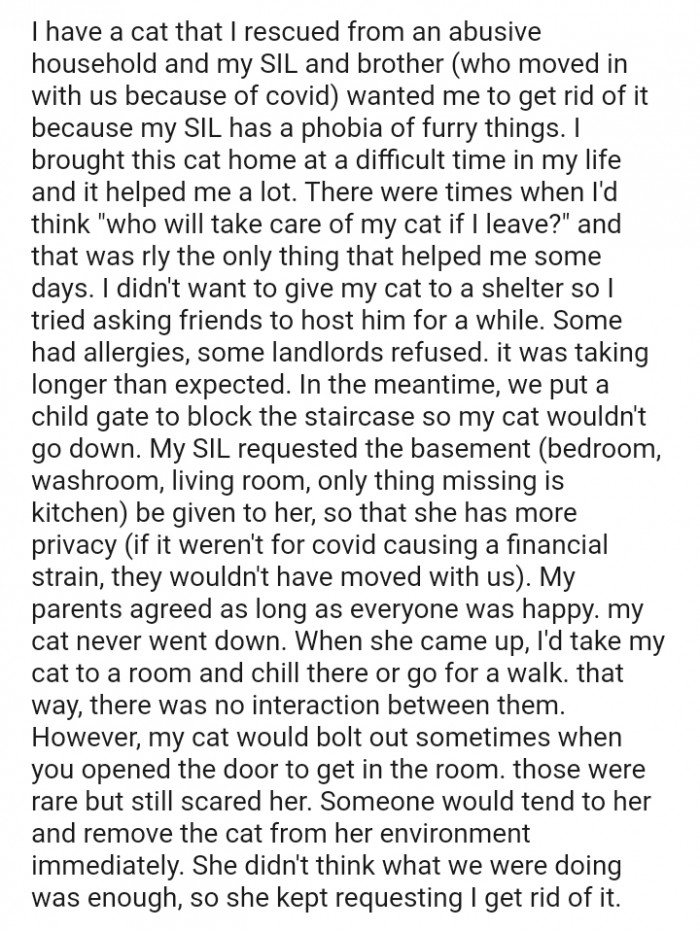
They kept asking me to get rid of my "stupid cat."

The Impact of Phobias on Family Dynamics
Phobias, particularly those related to animals, can significantly affect interpersonal relationships within families. Research indicates that individuals with animal phobias often experience heightened anxiety and may react defensively in situations involving pets.
Dr. Linda Jones, a clinical psychologist, explains that these reactions can stem from past traumatic experiences or learned behaviors, creating tension when family members are unable to understand the phobic response.
Understanding Phobias and Their Impact
Phobias, particularly those related to animals, can significantly affect interpersonal relationships. According to Dr. Emily K. Shapiro, a clinical psychologist specializing in anxiety disorders, phobias often stem from early experiences and can manifest in adulthood, influencing relationships with others.
It's crucial to recognize that these fear responses are not merely irrational but can evoke intense emotions and physical reactions.
She told me she wanted a new start, without any resentment.
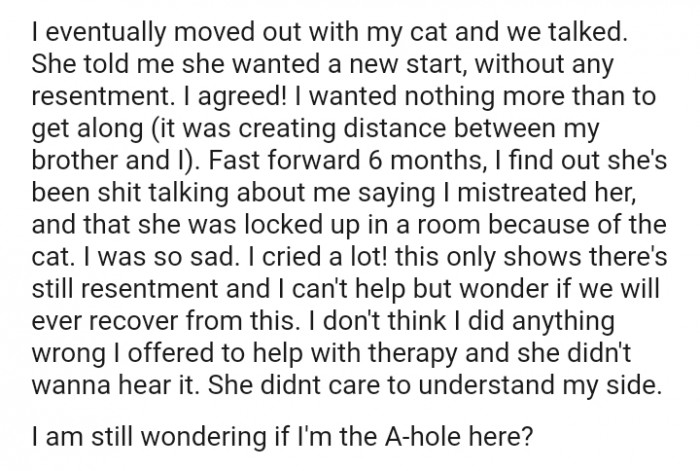
The OP shared a lot of information in the comments, and we've gathered some of the top comments from the Reddit post below.

It affects the OP's relationship with her brother.
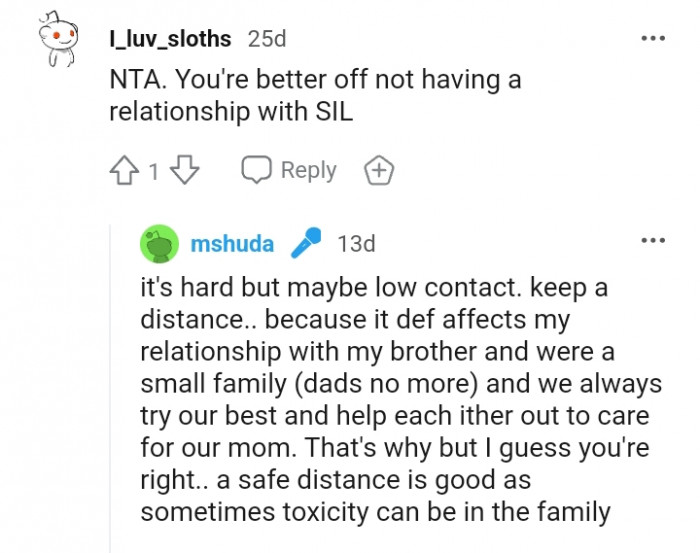
According to studies published in the Journal of Abnormal Psychology, individuals with phobias often display avoidance behaviors, which can lead to conflicts when family expectations clash with personal fears. In this case, the sister-in-law’s phobia may cause her to perceive the cat as a threat, resulting in accusations of maltreatment from the owner.
This highlights the need for empathy and understanding within family dynamics when dealing with mental health issues.
Research published in the Journal of Abnormal Psychology suggests that individuals with phobias may experience heightened anxiety in situations where their fears are triggered. This can lead to avoidance behaviors, complicating relationships with those who may not understand the depth of the phobia.
Understanding the psychological underpinnings of phobias can foster empathy among family members, promoting healthier interactions.
The OP feels the same way too.

It is not an excuse to be cruel.

The cat is something important to you.

Addressing Phobias within the Family
Experts suggest that open conversations about phobias can lead to greater understanding and support within families. Encouraging the sister-in-law to seek therapy, such as cognitive-behavioral therapy (CBT), has been shown to be effective in treating specific phobias.
Involving family members in this therapeutic process can also foster empathy and help them learn how to support the individual coping with the phobia effectively.
Balancing Love for Pets with Family Dynamics
Finding a balance between pet ownership and accommodating family members' fears is a delicate task. Experts suggest that open communication about feelings surrounding the pet can help all parties understand each other's perspectives.
Creating safe spaces for both the pet and the family member with a phobia can help bridge the gap and reduce anxiety levels.
You are under no obligation to change that.

This has less to do with her phobia.

You do not need that negative energy.

To create a more harmonious environment, families might consider establishing designated spaces where the cat can be kept separate from the sister-in-law during visits. This compromise can help reduce anxiety while allowing the cat owner to maintain their bond with their pet.
Family meetings can also serve as a platform for discussing boundaries and exploring solutions that respect everyone’s needs.
Behavioral therapy can be an effective approach for addressing phobias. Techniques such as gradual exposure can help individuals confront their fears in a controlled and supportive environment. "Gradual exposure allows individuals to face their fears step by step, reducing anxiety over time," explains Dr. Susan David, an emotional agility expert. Her insights emphasize that these techniques can lead to significant reductions in anxiety and avoidance behaviors, facilitating healthier relationships.
Keep your furry friend with you.

Your cat is your little companion.

She moved into a house where a cat already resides.

The Importance of Empathy and Understanding
Empathy is crucial in navigating relationships where phobias are involved. Understanding that fear responses are deeply rooted and can trigger intense emotions can help family members respond with compassion.
Psychologists recommend fostering an environment where feelings can be expressed openly without judgment, allowing for more constructive dialogues.
She is talking badly about you behind your back.

You should not talk to her anymore.

What she's asking you to do is completely unreasonable.

Ultimately, finding common ground is essential for maintaining harmony in family dynamics. This may involve compromises, such as setting boundaries around the pet's presence to ensure everyone feels safe.
Encouraging family meetings to discuss concerns can promote understanding and help everyone feel valued in the decision-making process.
You had no duty to accommodate her.
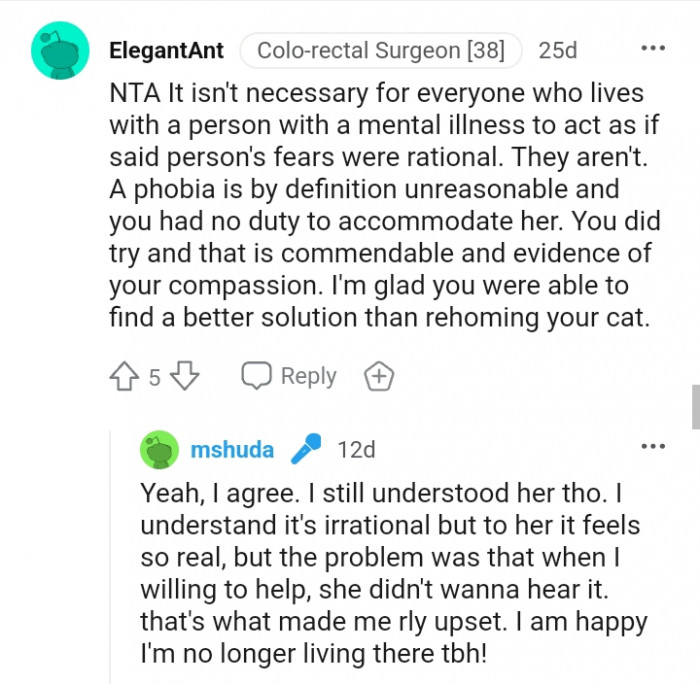
Cats aren't just things you throw out.
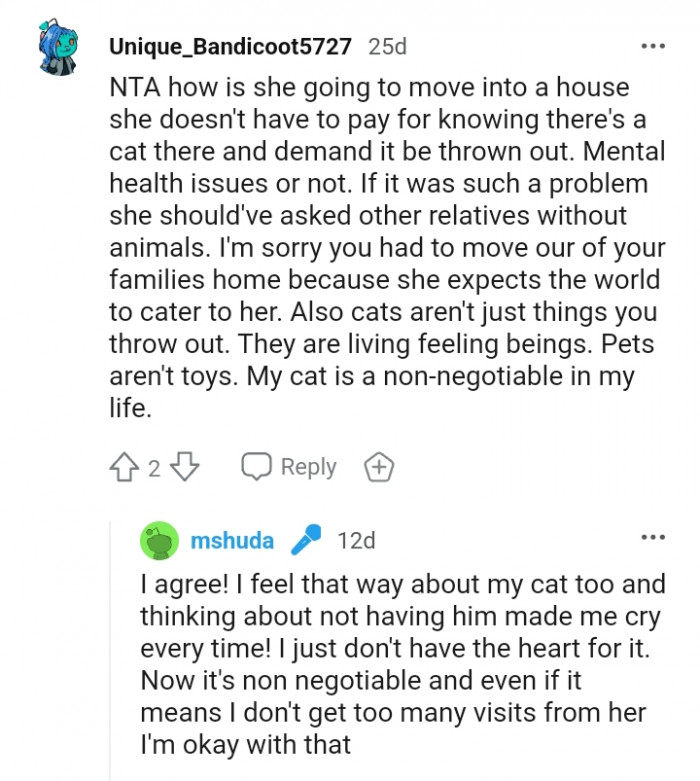
She is a total, absolute, complete AH.

Strategies for Managing Phobias in Family Settings
Proactive strategies, such as educating family members about phobias, can enhance understanding and reduce stigma. Learning about the psychological effects of phobias can help family members empathize with the individual experiencing fear.
Additionally, involving a therapist in discussions can provide neutral ground for addressing concerns and developing effective coping strategies.
Adoption of a pet is for life.

You were nice enough to let her stay with you.

Did you move out of your home?

In conclusion, navigating the complexities of pet ownership in the face of a family member's phobia requires patience and understanding. By employing empathy and open communication, families can foster healthier relationships.
Research from the Journal of Clinical Psychology shows that supportive environments are crucial for reducing anxiety and improving family dynamics.
You pledge to provide for an animal when you adopt it. The OP's cat was living in the house before the SIL came.
After all, the OP was exerting every effort to make the living arrangement work for her. Redditors advised the OP not to feel guilty for not leaving their animal behind.
Drop your thoughts about this story in the comments section below.
Psychological Analysis
This situation highlights the challenges of balancing pet ownership with the needs of family members who have phobias. It's essential to approach these dynamics with sensitivity and a willingness to compromise.
Encouraging open conversations about fears can help families work together to find solutions that respect everyone's needs.
Analysis generated by AI
Analysis & Alternative Approaches
Understanding the psychological foundations of phobias can help families navigate challenging dynamics involving pets. By fostering empathy and open communication, relationships can thrive even in the face of fears.
As clinical psychologists emphasize, creating a supportive environment is essential for both emotional well-being and family harmony.
Analysis & Alternative Approaches
In summary, understanding the dynamics of phobias within family relationships is crucial for fostering empathy and support. Dr. Alexandra Solomon, a relationship therapist, emphasizes that "open conversations about fears can lead to deeper connections and understanding among family members." Addressing mental health issues openly can strengthen familial bonds and create a more inclusive environment. Ultimately, it's about finding common ground and respecting each individual's emotional responses while nurturing healthy relationships.



